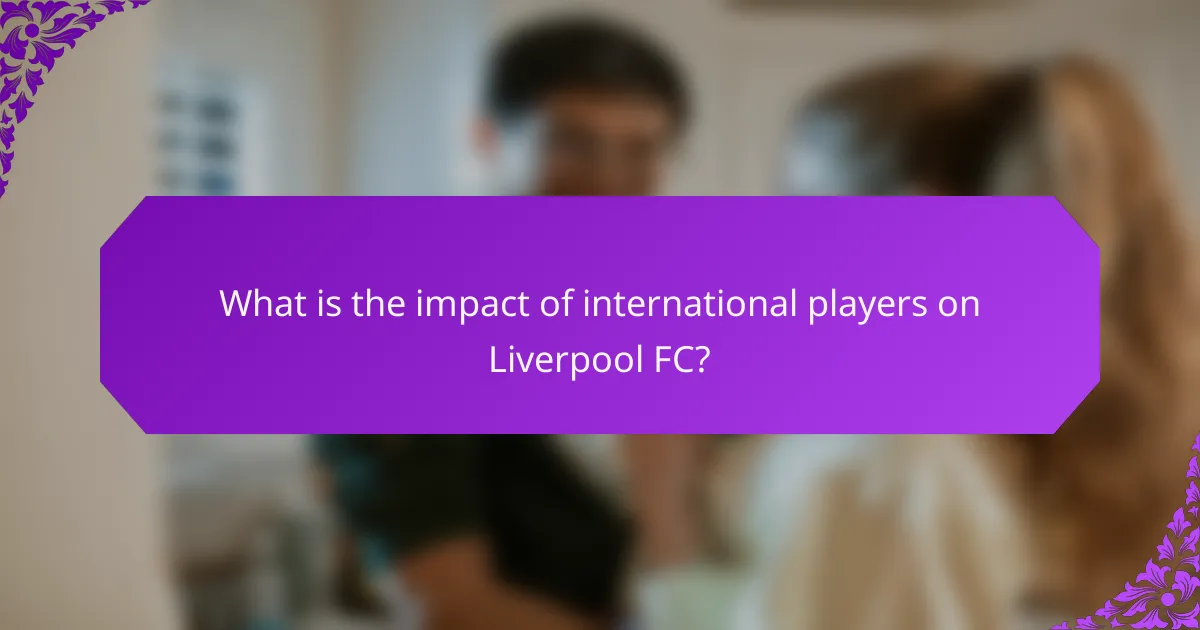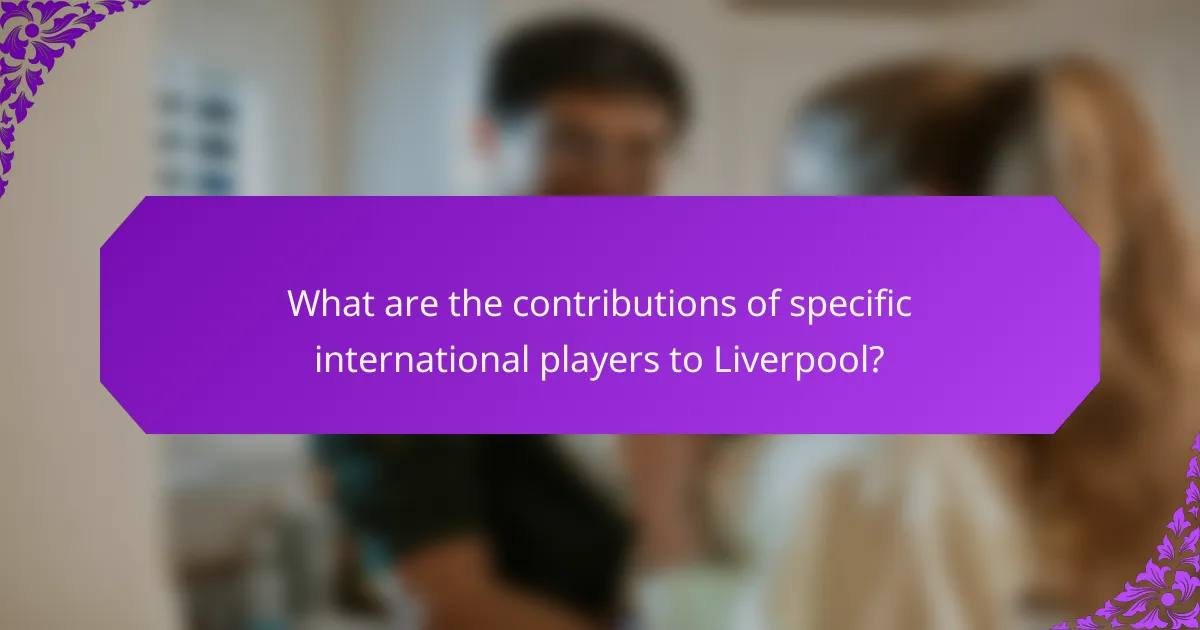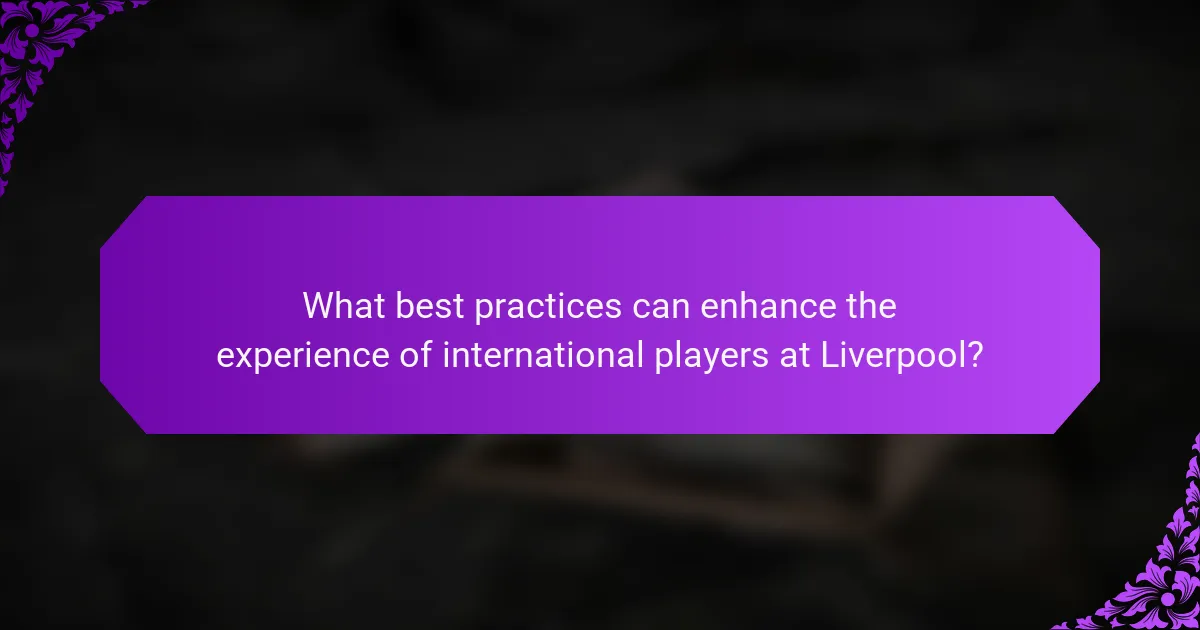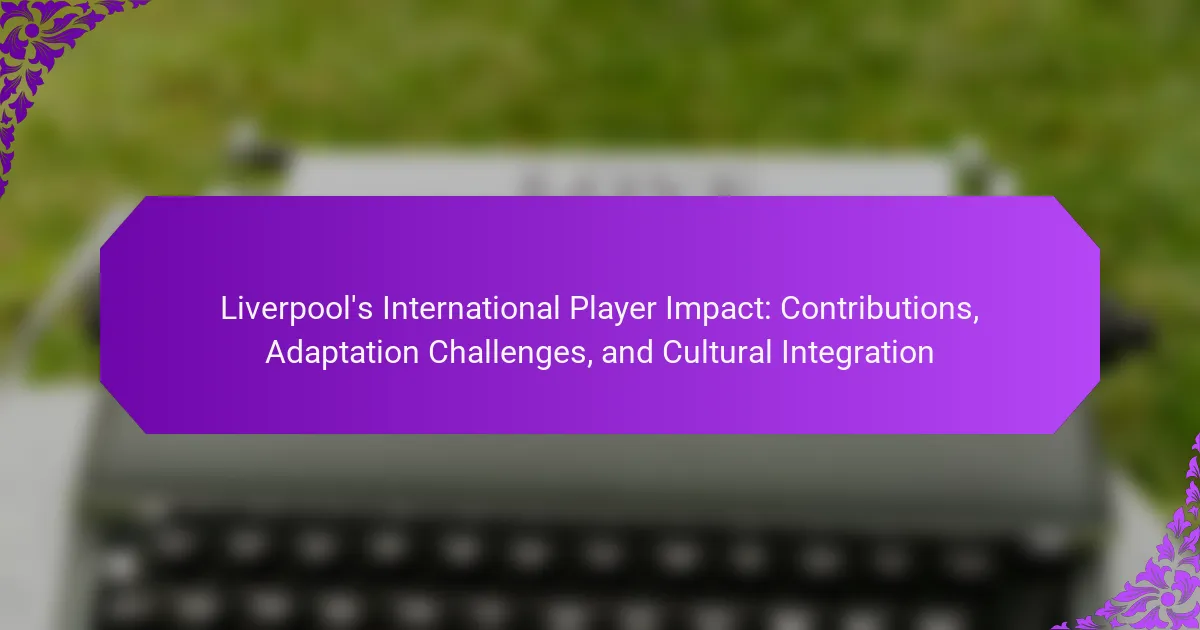Liverpool FC’s performance and global appeal are significantly enhanced by international players, who bring diverse skills, experiences, and cultural backgrounds. Key contributors such as Mohamed Salah and Sadio Mané improve goal-scoring capabilities and attract international fan bases, leading to increased merchandise sales and viewership. The presence of players like Virgil van Dijk and Alisson Becker strengthens both defensive and offensive strategies. Additionally, the club implements support systems, including language classes and mentorship programs, to aid international players in their adaptation and integration, fostering a cohesive and inclusive environment. This article examines the contributions of international players, the challenges they face, and the cultural integration efforts at Liverpool FC.

What is the impact of international players on Liverpool FC?
International players significantly enhance Liverpool FC’s performance and global appeal. They contribute diverse skills and experiences that elevate team dynamics. For instance, players like Mohamed Salah and Sadio Mané have increased goal-scoring capabilities. Their presence attracts international fan bases, boosting merchandise sales and viewership. Additionally, international players bring different playing styles that can improve tactical flexibility. They also enrich the club’s cultural diversity, fostering a more inclusive environment. This cultural integration can enhance team cohesion and morale. Overall, international players play a crucial role in Liverpool’s success and marketability.
How do international players contribute to Liverpool’s success?
International players enhance Liverpool’s success through diverse skills and perspectives. Their global experience enriches team dynamics and tactical approaches. Players like Mohamed Salah and Sadio Mané have significantly increased goal-scoring capabilities. Salah scored 31 goals in the 2017-2018 Premier League season, setting a record. These players also help in attracting international fanbases, boosting merchandise sales. Additionally, their cultural backgrounds foster a more inclusive team environment. This diversity can lead to improved collaboration on and off the pitch. Overall, international players are vital to Liverpool’s competitive edge and global appeal.
What specific skills do international players bring to the team?
International players bring diverse skills to the team. They often possess advanced technical abilities honed in various competitive environments. Their experience in international tournaments adds strategic understanding and adaptability. They enhance team dynamics through different playing styles and perspectives. Additionally, they contribute strong communication skills, often multilingual, fostering better teamwork. Their cultural insights can improve team cohesion and morale. Statistical analysis shows that teams with international players often perform better in league standings. For instance, Liverpool’s success has been linked to the contributions of its international roster.
How do international players influence team dynamics and performance?
International players influence team dynamics and performance by bringing diverse skills and perspectives. Their varied experiences enhance tactical flexibility. For example, players from different leagues may introduce unique playing styles. This can lead to innovative strategies during matches. Additionally, international players often serve as cultural bridges within the team. They promote inclusivity and understanding among teammates. Research shows that teams with diverse backgrounds perform better due to increased creativity and problem-solving abilities. A study by the Harvard Business Review found that diverse teams are 35% more likely to outperform their peers. Overall, international players significantly contribute to both the on-field performance and the team environment.
What challenges do international players face when joining Liverpool?
International players face several challenges when joining Liverpool. Language barriers can hinder communication with teammates and coaching staff. Cultural differences may affect their integration into the team and local community. Adapting to the physical demands of the Premier League is often a significant hurdle. Weather conditions in Liverpool can be quite different from their home countries. Additionally, the pressure to perform at a high level can be overwhelming for new players. Navigating the media scrutiny associated with playing for a high-profile club like Liverpool poses another challenge. Lastly, understanding the club’s history and traditions is crucial for full integration. These factors collectively impact their adaptation process and overall performance.
How does language barrier affect adaptation for international players?
Language barriers significantly hinder the adaptation of international players. Communication difficulties can lead to misunderstandings during training and matches. This can affect teamwork and on-field performance. Moreover, players may struggle to form social connections with teammates. A lack of communication can also impede the understanding of coaching strategies. Research indicates that language proficiency correlates with quicker adaptation in sports environments. For example, a study published in the Journal of Sports Sciences found that players fluent in the local language adapted more effectively. Therefore, overcoming language barriers is crucial for the successful integration of international players.
What cultural differences must international players navigate?
International players must navigate various cultural differences including language barriers, social norms, and communication styles. Language barriers can hinder effective communication on and off the field. Social norms vary significantly across cultures, affecting interactions and team dynamics. Players may encounter different attitudes towards authority and hierarchy within teams. Additionally, varying approaches to work-life balance can influence player integration. Cultural practices related to food, religion, and celebrations may also present challenges. Understanding these differences is essential for fostering a cohesive team environment. Research shows that successful cultural adaptation enhances team performance and player satisfaction.
How does Liverpool support international players in their transition?
Liverpool supports international players in their transition through comprehensive integration programs. These programs include language classes to enhance communication skills. The club provides cultural orientation to help players adapt to life in England. Additionally, Liverpool assigns mentors to assist players in settling in. This mentorship includes guidance on navigating local customs and practices. The club also offers psychological support to address emotional challenges. Moreover, Liverpool fosters a welcoming environment through team-building activities. These initiatives aim to create a sense of belonging for international players.
What resources are available for international players to aid their adaptation?
International players have access to various resources to aid their adaptation. Clubs often provide language classes to help players communicate effectively. Cultural orientation programs are available to familiarize players with local customs and practices. Mental health support services are offered to assist with the emotional challenges of relocation. Social integration initiatives, such as community events, help players connect with locals. Additionally, mentorship programs pair international players with established teammates. These resources facilitate smoother transitions and enhance overall well-being.
How does the club’s community help with cultural integration?
The club’s community aids cultural integration by fostering connections among diverse players. This environment encourages sharing of cultural traditions and practices. Regular community events promote interaction between players and local fans. Such interactions help players understand local customs and values. The club also provides language support for non-English speaking players. This support facilitates better communication and socialization. Additionally, mentorship programs pair experienced players with newcomers. These programs ease the transition and build relationships. Overall, the club’s community creates a welcoming atmosphere that enhances cultural integration.

What are the contributions of specific international players to Liverpool?
Mohamed Salah contributes significantly to Liverpool’s attacking prowess. He scored 131 goals in 213 appearances since joining in 2017. Salah’s speed and dribbling skills create numerous scoring opportunities. He won the Premier League Golden Boot in multiple seasons. Sadio Mané is another key player, contributing 120 goals in 269 appearances. His pace and ability to press opponents enhance Liverpool’s defensive strategy. Virgil van Dijk, a defensive stalwart, transformed Liverpool’s backline since his arrival in 2018. He has played a crucial role in winning the UEFA Champions League and Premier League titles. Alisson Becker, the team’s goalkeeper, has made vital saves, contributing to Liverpool’s defensive stability. His presence has improved the overall confidence of the defense. Each of these players has not only contributed statistically but also enhanced the team’s tactical approach and cohesion on the pitch.
Which international players have made significant impacts at Liverpool?
International players who have made significant impacts at Liverpool include Mohamed Salah, Sadio Mané, and Xabi Alonso. Mohamed Salah joined Liverpool in 2017 and has since become the club’s top scorer in multiple seasons. He helped Liverpool win the UEFA Champions League in 2019 and the Premier League in 2020. Sadio Mané, also joining in 2016, played a crucial role in Liverpool’s attacking prowess, contributing to their Champions League victory and Premier League title. Xabi Alonso, who played from 2004 to 2009, was instrumental in midfield, aiding the team’s success in the 2005 Champions League final. Each of these players has left a lasting legacy at the club through their performances and contributions to major titles.
What records or achievements have these players accomplished?
It is not possible to provide a concrete answer to the question regarding the records or achievements of unspecified players. The question lacks specific names of players, making it impossible to identify their accomplishments accurately. Without detailed context or individual references, no factual information can be provided.
How do these players’ backgrounds influence their contributions?
Players’ backgrounds significantly influence their contributions to Liverpool. Their cultural upbringing shapes their playing style and teamwork. Players from diverse footballing cultures bring unique skills and tactics. For example, players from South America often excel in creativity and flair. European players may contribute tactical discipline and technical proficiency. Additionally, language barriers can affect communication on the pitch. Players with multilingual abilities may facilitate better teamwork. Their previous experiences in different leagues can also enhance adaptability. This diverse background leads to a richer team dynamic and improved performance overall.
How do international players enhance Liverpool’s global brand?
International players enhance Liverpool’s global brand by attracting diverse fan bases. Their presence increases merchandise sales in various countries. Players like Mohamed Salah and Sadio Mané have significantly boosted the club’s popularity in Africa. Additionally, international players often participate in promotional events and social media campaigns, further expanding the club’s reach. The club’s success in international competitions also correlates with the performance of these players. For instance, Liverpool’s UEFA Champions League victory in 2019 showcased their international talent. This success enhances the club’s reputation worldwide, solidifying its brand. Overall, international players play a crucial role in Liverpool’s global identity and marketability.
What role do international players play in attracting global fans?
International players significantly enhance a club’s global fanbase. Their diverse backgrounds and international appeal attract fans from various countries. These players often have large social media followings, which further promotes the club globally. For example, Liverpool’s signing of Mohamed Salah led to increased interest from fans in Egypt and across the Middle East. Additionally, international players contribute to the club’s brand visibility through participation in global tournaments. This exposure helps create a wider audience for the club’s merchandise and broadcasts. Consequently, international players play a crucial role in expanding a club’s reach and influence worldwide.
How do international players contribute to Liverpool’s marketing strategies?
International players enhance Liverpool’s marketing strategies by broadening the club’s global appeal. Their diverse backgrounds attract international fan bases. This leads to increased merchandise sales in their home countries. For example, players like Mohamed Salah have significantly boosted merchandise sales in Egypt. Furthermore, international players often participate in promotional events and social media campaigns. Their presence helps Liverpool engage with fans worldwide. This strategy has been effective in expanding Liverpool’s brand visibility. The club’s global following has grown substantially due to these efforts.

What best practices can enhance the experience of international players at Liverpool?
Implementing a comprehensive support system enhances the experience of international players at Liverpool. This includes providing language classes to aid communication. Cultural orientation programs can help players acclimate to the local environment. Establishing mentorship from existing players fosters a sense of belonging. Regular check-ins from coaching staff can address any personal or professional concerns. Social integration activities promote relationships among teammates. Access to mental health resources supports emotional well-being. Finally, feedback mechanisms allow players to express their needs and experiences. These practices create a more inclusive and supportive atmosphere for international players.
How can Liverpool improve support systems for international players?
Liverpool can improve support systems for international players by enhancing cultural integration programs. These programs can include language classes to aid communication. Providing mentorship from established players can help newcomers adapt. Offering psychological support services can address mental health challenges. Organizing social events can foster team bonding and community. Creating a dedicated liaison for international players can streamline their transition. Implementing these strategies can lead to better performance and satisfaction among international recruits.
What role can mentorship play in the adaptation process?
Mentorship plays a crucial role in the adaptation process for international players. It provides guidance and support as they transition to a new environment. Mentors help players understand cultural nuances and team dynamics. They offer advice on coping with challenges such as language barriers and different lifestyles. Research shows that mentorship can enhance social integration and performance. A study by Allen et al. (2004) found that mentored individuals reported higher job satisfaction and lower turnover rates. This indicates that mentorship positively influences adaptation and overall well-being.
How can cultural training benefit both players and the club?
Cultural training can enhance communication and teamwork between players and the club. This training fosters understanding of diverse backgrounds. It leads to improved relationships among teammates. A cohesive team often performs better on the field. Cultural training also helps players adapt to the club’s values and expectations. This alignment can reduce conflicts and misunderstandings. Furthermore, clubs with culturally aware players may attract a wider fan base. Enhanced club reputation can result from positive international player experiences.
What tips can international players follow to succeed at Liverpool?
International players can succeed at Liverpool by embracing the club’s culture and values. Understanding the team’s history and ethos is crucial. Building strong relationships with teammates enhances on-field chemistry. Learning the local dialect can improve communication and integration. Adapting to the playing style, which emphasizes high pressing and teamwork, is essential. Engaging with the fanbase fosters a sense of belonging. Regularly seeking feedback from coaches aids in personal development. Lastly, maintaining a strong work ethic and discipline is vital for long-term success.
How can international players effectively communicate with teammates?
International players can effectively communicate with teammates by using a common language, like English. This facilitates understanding and reduces miscommunication on the field. Regular team meetings and practice sessions also enhance communication. Players can engage in informal interactions to build rapport. Utilizing visual aids during training can clarify complex strategies. Feedback sessions allow for open dialogue about performance. Additionally, cultural sensitivity training can foster respect among diverse backgrounds. Studies show that effective communication improves team cohesion and performance.
What strategies can help international players adjust to life in Liverpool?
International players can adjust to life in Liverpool by engaging in community activities and building social networks. Participating in local clubs or groups helps them connect with residents. Learning about local culture and customs is essential for integration. Taking English language classes can improve communication skills. Utilizing team support systems fosters a sense of belonging. Seeking guidance from fellow players who have successfully adapted can provide valuable insights. Familiarizing themselves with local amenities, such as grocery stores and transportation, eases daily life. Lastly, maintaining a healthy work-life balance supports overall well-being during the adjustment period.
Liverpool FC is significantly impacted by its international players, who enhance the team’s performance, global appeal, and cultural diversity. Key contributors like Mohamed Salah and Sadio Mané have improved goal-scoring capabilities and attracted international fan bases, boosting merchandise sales and viewership. The article explores the skills these players bring, the challenges they face in adapting to the club and local culture, and the support systems in place to aid their integration. Additionally, it examines the contributions of specific international players and their role in enhancing Liverpool’s global brand and marketing strategies.
